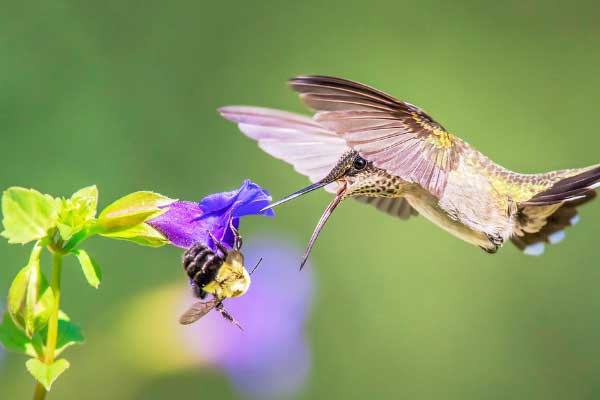Hummingbirds are fond of nectar. But that’s not all. These birds also eat insects for proteins and essential vitamins and minerals. That said, bees are always looking for nectar and interact with these birds often. And it only makes perfect sense that they make a ready source of proteins for the birds.
But how true is this? Do hummingbirds eat birds? NO. Hummingbirds do not eat bees. No recorded evidence shows these birds eat bees. Going by the size of the bird’s bill further makes it impossible for them to eat bees. The birds have been observed chasing away bees from their feeders and vice versa.
In this guide, we have shared more info about the hummingbirds eating bees, the relationship between the two creatures, and helpful tips on keeping bees away from the hummingbird feeders.
Do hummingbirds eat bees?
Absolutely No. Hummingbirds do NOT eat bees. While you’ll see the two interacting most of the time, they simply compete for nectar. But that’s it. No evidence exists up to today that shows hummingbirds eat bees. There are many bee-eating birds known today, but no hummingbird has been observed catching a bee with its beak.
Who knows, the hummingbirds know that bees can sting and don’t want to mess around with them!
The venom packed in a bee or wasp sting is enough to overwhelm the bird’s small body system and result in death. Take, for instance, the Ruby-Throated Hummingbird species, which weighs only 3 grams and measures approx. 3 inches. With such a small body system, it will rarely win in a fight against the venom injected by a bee or wasp.
Also, given the size of the bird’s bill, eating an insect as big as a bee will be almost impossible.
The hummingbirds have been observed chasing bees away from their feeders or flowers. However, the timid species of this bird prefer to keep their distance from the bees.
Since bees are usually less aggressive, hummingbirds tend to leave them alone for the most part.
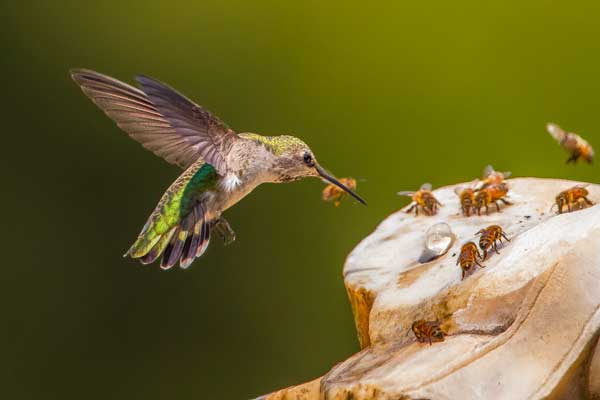
Not just bees, hummingbirds also do NOT eat wasps. You may also find the hornets, yellow jackets, and wasps attracted to hummingbird feeders.
But you’ll never catch the nectar-loving birds eating any of them. This is because these insects are too big for them. They’re also too aggressive and will often result in a fight.
People have observed the hummingbirds kill the wasps and vice versa. Still, hummingbirds will never, under any circumstances, go for the wasps, yellow jackets, or hornets.
If you’re concerned about the wasp population in your yard, you may want to avoid increasing the hummingbird population in your area. This is because both the birds and wasps feed on smaller insects. Too many hummingbirds will mean less number of small insects for the wasps to eat.
Nonetheless, hummingbirds still eat insects for proteins. Ornithologists have dissected these birds before and found remains of various insects in their stomachs. The most common insects the birds feed on include flies, aphids, gnats, leafhoppers, spiders, and beetles.
Hummingbirds vs. bees: hunting for nectar
Now that we have said that hummingbirds do not eat bees, you may still see them interacting peacefully or confronting each other. This is because they’re both attracted to the same food source—nectar.
Nectar occurs naturally in all flowering plants, but you can also provide these animals with homemade nectar. Most homeowners have hummingbird feeders where they place this homemade nectar. And these give you an easy way to watch the birds interact with the bees or even wasps.
As you watch the hummingbirds at feeder sucking nectar on a typical summer day, you’ll notice the bees and wasps always getting attracted to the feeder. And since they all need nectar for survival, a confrontation will most likely ensue!
For the most part, hummingbirds tend to coexist peacefully with the bees. But the bees may end up chasing the birds if they feel threatened.
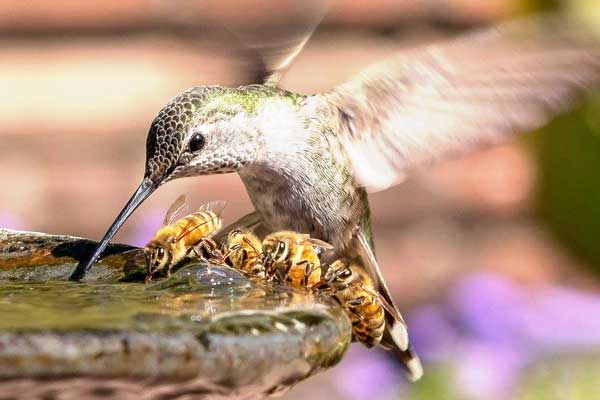
Wasps, however, are a bit more aggressive. Hummingbirds seem to understand this fact quite well and will always yield to them when competing for a food source.
Overall, if the bees and wasps become too much of a nuisance, the hummingbirds are always the first to leave in search of other nectar sources.
Do hummingbirds keep bees away?
As stated above, hummingbirds and bees usually coexist peacefully unless one of them feels threatened or provoked.
The hummingbirds may sometimes try to keep away the bees when competing for nectar.
They may use their bills to remove the bees from the flowers. Or they may produce a sound or initiate a flight to scare the bees.
These birds have also been observed protecting the flower in an attempt to keep the bees away.
Unfortunately, the tiny birds don’t always succeed in chasing away the bees. This is because the insects are usually reluctant to move on and don’t get easily scared by these little birds.
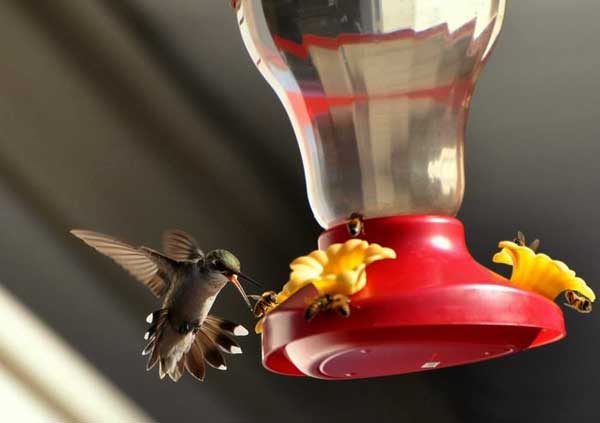
In most cases, the bees come in large numbers, making it hard for the hummers to drive them away.
On their part, bees are not that aggressive but will sometimes outflank and attack the hummingbirds. The less timid species of hummingbirds opt to move away in such cases instead of confronting the bees.
The hummers are afraid of the bees’ sting and would rather flee when attacked by bees than fight them.
How to keep wasps away from hummingbird feeders?
If you’re feeding hummingbirds in your yard, chances are high that the bees and wasps may have taken over. And you may start getting afraid that the birds won’t get any nectar.
So, what can you do to ensure the birds get their share of the nectar?
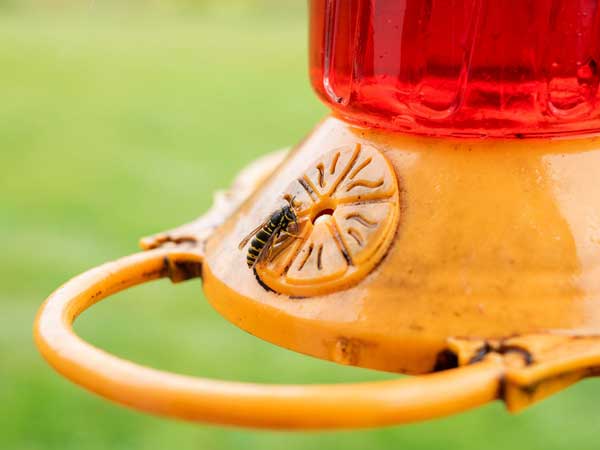
Below are 9 effective tips to help you keep away bees and wasps from your feeders:
1. Get a saucer-style feeder
One of the ways you can keep bees away from your hummingbird feeders is by using a sauce-style feeder. This feeder places the nectar away from the feeder ports, making it for the insects to get it. Hummingbirds, on the other hand, have a long tongues and easily get the nectar without any trouble. An added advantage of these feeders is that they drip less than typical feeders, meaning less mess to deal with.
2. Utilize bee guards in your feeder
Bee guards are a helpful accessory for a bird feeder to help bee-proof it. It simply involves air space to keep the bees from reaching for the juice while giving the hummingbirds easy access. These effective deterrents are easily accessible; they easily install on an existing feeder, and you can replace them easily.
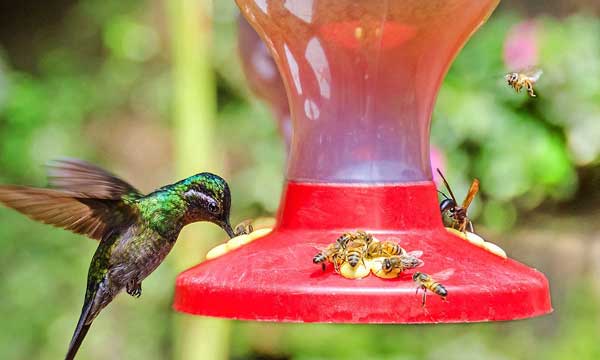
3. Move your feeder around
Bees prefer convenience anytime and are more inclined to stick to one nectar source. Moving the feeder around (but not too far from the initial location) can, therefore, confuse these insects as they struggle to find their new spot. You may also consider taking down the feeder for a few days to see if the bees will forget about it.
4. Go RED!
Did you know that bees and wasps don’t find red attractive? Now you know! With this knowledge in mind, going with red hummingbird feeding stations is a sure way to keep these unwanted insects from your feeder.
5. Avoid the color yellow!
If the bees and wasps are not attracted to red, what are they attracted to? Can you make a guess? Bees find yellow quite appealing! For this reason, you want to avoid any feeders with yellow guards or yellow flower accents to minimize the insects’ attraction to the feeders.
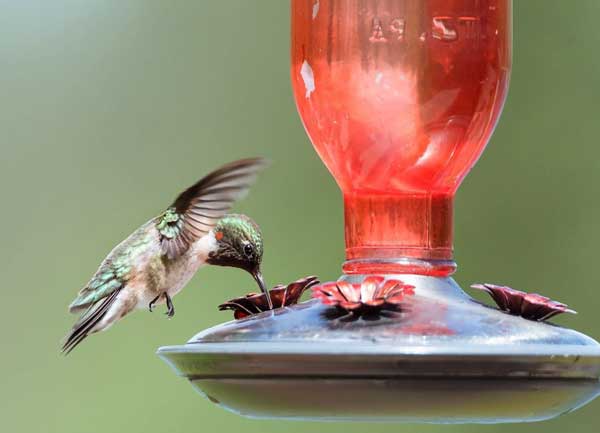
6. Inspect your feeder for leaks
Drips and leaks will likely attract ants, bees, and other insects that will likely take over your hummingbird feeder. Always inspect your feeder for any leaks and seal them in time to prevent the mess that invites the bees. Ensure the seal between feeding ports and the reservoir stays properly aligned and is tight to prevent leaks. Also, avoid overfilling the feeder to overflowing and causing leaks.
7. Clean the nectar feeders regularly
You should also make a habit of cleaning your feeders regularly. This will help prevent nectar spills that attract bees, wasps, ants, and other insects. Regular cleaning also reduces the chances of spoilt food that could risk the little birds’ health.
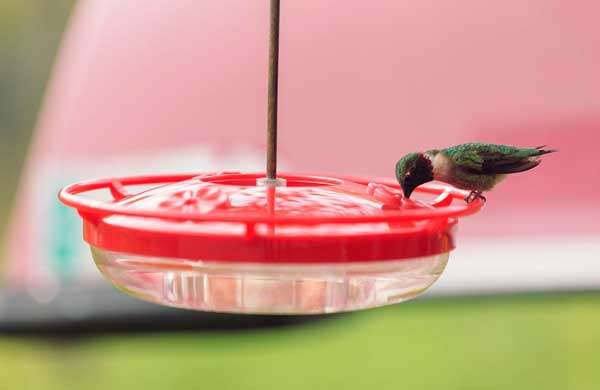
8. Alter the sweetness of your nectar
Bees can be picky and prefer the sweetest nectar available. Thus, if you reduce the amount of sugar in your homemade nectar, you might force them to look for sweet nectar sources. The best sugar ratio for nectar for bees or wasps is 3:1 or 4:1. But if you alter the sugar ratio it to 5:1 will still attract the birds while chasing away the insects as they go on to search for sweeter sugar water solution or nectar.
9. Plant a pollinator garden
Another way to get bees and wasps from your bird feeders is by diverting the attention of the bees and wasps to other nectar sources. And you can do this by planting a pollination garden that attracts bees. If you grow a variety of floral nectar sources that bees can’t resist, they’ll easily leave the feeders and go flower to flower feeding on natural nectar. For long-season feeding, consider planting a mixture of annuals and perennials with staggered bloom times.
Related questions:
No, hummingbirds don’t fight bees. It is common to see the two creatures interacting when sucking nectar from flowers. However, the birds tend to avoid areas with many bees due to too much competition. The bees might also confront the hummingbirds at times, in which case the birds opt to leave and look for other nectar sources.
Wasps can hurt hummingbirds. These insects are more aggressive compared to bees. They’re also nectar loving and will appear on your hummingbird’s feeding stations, where they’re likely to chase away the birds. Like bees, hummingbirds will opt to leave the nectar to wasps and search for other sources of nectars.
Yes, yellow jackets are as aggressive as wasps. They even go to the point of stinging and chasing away hummingbirds from their feeders. Therefore, you must try as much as possible to keep them off your hummingbird feeders to prevent the birds from suffering from harm inflicted by the stings, which can easily kill them.
Final Verdict
Hummingbirds and bees love nectar, but the former doesn’t feed on the latter. Although the nectar-loving birds also feed on insects for proteins, they feed on other insects such as aphids, ants, gnats, etc. but not bees. The two creatures interact when looking for nectar, but if there are too many bees, the birds would rather flee than fight them.
Having read this in-depth discussion about hummingbirds and bees, we’re hopeful that now you understand how the two animals relate. If you have hummingbird feeders in your yard, follow the tips discussed in this guide to keep away bees and wasps and ensure the birds enjoy their share of your homemade nectar in peace.
